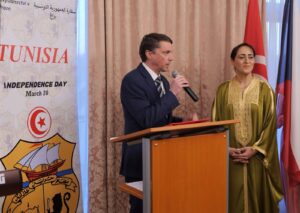- Hans Weber
- March 27, 2025
Tunisian National Day –March 20th
On Thursday, March 20th, H.E. Yosra Souiden, Ambassador of Tunisia, invited representatives of the diplomatic corps in the Czech Republic and friends of Tunisia from business, politics, and culture to a reception at her residence on the occasion of the national holiday.
Also, President Klaus and his wife, Livia Klausová honored the event with their presence
After the two national anthems, H.E. Yosra Souiden and Deputy Foreign Minister Jiří Kozák, representing the Czech government, delivered a speech.
The event focused on the two countries’ political, economic, and cultural relations.
The celebration was rounded off with exquisite Tunisian culinary specialties.
Tunisia celebrates its National Day on March 20, marking the country’s independence from French colonial rule in 1956. This historic event represents the culmination of a long struggle for sovereignty and self-determination, making it one of the most important days in Tunisia’s national history.
Historical Background
Tunisia was a French protectorate from 1881 to 1956, during which time the country experienced political, economic, and social changes under colonial administration. The struggle for independence gained momentum in the early 20th century, particularly with the rise of nationalist movements like the Neo Destour Party, led by Habib Bourguiba.
After years of negotiations, protests, and political pressure, France finally granted full independence to Tunisia on March 20, 1956. Habib Bourguiba became the country’s first Prime Minister and later its first President after Tunisia declared itself a republic in 1957.
Celebrations and Traditions
Tunisian National Day is celebrated with official ceremonies, public events, and patriotic displays throughout the country. The President and government officials often deliver speeches highlighting the importance of independence and national unity. The Tunisian flag is displayed prominently on buildings, streets, and public squares.
In the capital, Tunis, and other major cities, parades, concerts, and cultural events are organized to honor the nation’s history. Schools and institutions hold educational programs to teach young generations about Tunisia’s independence struggle. Many Tunisians also celebrate by gathering with family and friends, reflecting on the country’s achievements and challenges.
Significance Today
Beyond being a historical commemoration, March 20 serves as a reminder of Tunisia’s resilience and progress. The country has undergone significant political and social transformations since gaining independence, including the 2011 Tunisian Revolution, which led to a new era of democracy.
Tunisia’s National Day is not just about remembering the past but also about looking toward the future. It is a day to celebrate freedom, democracy, and the ongoing efforts to build a stronger nation. Whether through official ceremonies or personal reflections, March 20 remains a symbol of Tunisian pride and national identity.
Recent posts
See AllPrague Forum Membership
Join us
Be part of building bridges and channels to engage all the international key voices and decision makers living in the Czech Republic.
Become a member




